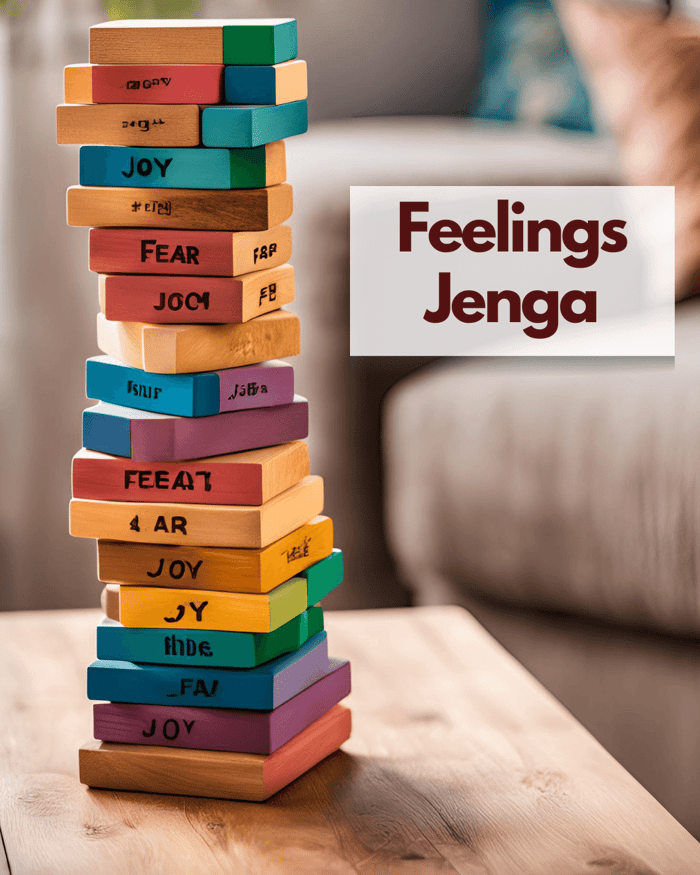Table of Contents
- What Is Feelings Jenga?
- Why Use Feelings Jenga in Christian Therapy for Adults?
- How to Set Up Feelings Jenga for Adults in Therapy
- List of Emotions to Use in Feelings Jenga
- How to Use Feelings Jenga in Therapy for Adults
- Adjusting Feelings Jenga for Different Therapy Settings
- Final Thoughts
- Download Your Free Jenga Feelings Worksheet!
- FAQs
Using Feelings Jenga to Help Adults Process Emotions: A Therapeutic Technique for Christian Therapists
Using Feelings Jenga to Help Adults Process Emotions: A Therapeutic Technique for Christian Therapists
 Emotional processing is essential for healing, growth, and resilience. However, many adults struggle to express and regulate their emotions, especially when facing past trauma, stress, or spiritual battles. As Christian therapists, integrating faith-based techniques into therapy can provide clients emotional relief and biblical guidance.
Emotional processing is essential for healing, growth, and resilience. However, many adults struggle to express and regulate their emotions, especially when facing past trauma, stress, or spiritual battles. As Christian therapists, integrating faith-based techniques into therapy can provide clients emotional relief and biblical guidance.
Feelings Jenga is a powerful tool for emotional processing, a therapeutic adaptation of the classic game designed to help adults explore emotions, gain self-awareness, and connect their experiences with biblical truth. This article will explore how Feelings Jenga can be effectively used in Christian therapy, the benefits for adult clients, a comprehensive list of emotions to include, and strategies for integrating scripture into sessions.
What Is Feelings Jenga?
Feelings Jenga is a modified version of the traditional Jenga game that encourages emotional expression and self-reflection. Instead of simply removing a block, each pulled block contains a specific emotion, discussion prompt, or scripture reference to guide meaningful conversations.
This game can help adults uncover deep-seated emotions, unresolved wounds, and areas of spiritual growth. Christian therapists can use this interactive approach to assist clients in understanding their feelings based on biblical principles and evidence-based therapeutic techniques.
Why Use Feelings Jenga in Christian Therapy for Adults?
While play therapy is commonly associated with children, experiential and interactive techniques in counseling can also benefit adults. Many clients struggle to discuss difficult emotions, but a structured and engaging activity like Feelings Jenga can make emotional exploration less intimidating.
Key Benefits for Adults:
✔ Encourages Emotional Awareness – Helps adults recognize and name emotions they may have suppressed or ignored.
✔ Promotes Vulnerability in a Safe Space – Many adults avoid discussing emotions due to fear of judgment. This game fosters open dialogue.
✔ Bridges Therapy and Faith – Allows clients to see how their emotions align with biblical principles and God’s plan for healing.
✔ Enhances Emotional Regulation – Clients learn to process emotions constructively rather than reacting impulsively.
✔ Provides a Non-Threatening Approach – Engaging in a structured game removes the pressure of direct conversation, making it easier to open up.
✔ Encourages Spiritual and Emotional Reflection – Prompts clients to connect their emotions to faith, scripture, and God’s healing power.
How to Set Up Feelings Jenga for Adults in Therapy
Materials Needed:
✔ A standard Jenga set
✔ Permanent markers or colored stickers
✔ A list of emotions and discussion prompts
✔ Scripture reference cards (optional)
Customizing the Blocks for Adult Clients:
- Write One Emotion Per Block. Examples include grief, shame, joy, frustration, relief, anger, disappointment, hope, resentment, and peace.
- Add Thought-Provoking Prompts–
- What has this emotion taught you about yourself?
- How do you typically express this emotion?
- What does God say about this feeling?
- Incorporate Scripture – Each emotion can be connected to a Bible verse that provides wisdom, encouragement, or healing.
List of Emotions to Use in Feelings Jenga
Emotions can be categorized to cover different aspects of personal and spiritual growth:
Common Emotions in Adult Therapy:
✅ Positive Emotions:
- Joy (Psalm 118:24)
- Peace (John 14:27)
- Love (Romans 8:38-39)
- Hope (Jeremiah 29:11)
- Gratitude (1 Thessalonians 5:18)
- Confidence (Philippians 4:13)
🔴 Difficult Emotions:
- Anger (Ephesians 4:26)
- Shame (Romans 8:1)
- Anxiety (Philippians 4:6-7)
- Loneliness (Deuteronomy 31:8)
- Guilt (1 John 1:9)
- Resentment (Ephesians 4:31-32)
🌱 Healing Emotions:
- Forgiveness (Colossians 3:13)
- Restoration (Psalm 147:3)
- Trust (Proverbs 3:5-6)
- Encouragement (Isaiah 41:10)
- Surrender (Matthew 11:28-30)
Each emotion can be paired with a discussion prompt and a Bible verse to guide clients toward emotional regulation and biblical healing.
How to Use Feelings Jenga in Therapy for Adults
Explain the Purpose of the Game
- Let your client know this exercise is designed to help them explore emotions, reflect on scripture, and process feelings safely.
- Emphasize that there are no right or wrong answers.
Set Ground Rules
- Each player takes turns pulling a Jenga block.
- When they pull a block, they must read the emotion and respond to the prompt.
- Discuss how they typically experience and cope with that emotion daily.
- If applicable, connect the emotion to scripture and explore God’s guidance.
Encourage Reflection and Discussion
- If a client pulls the "Shame" block, a discussion prompt could be:
"How has shame impacted your self-worth? What does Romans 8:1 tell us about condemnation?" - If they pull the "Hope" block, you might ask:
"What gives you hope even in difficult seasons? How does Jeremiah 29:11 encourage you?"
- If a client pulls the "Shame" block, a discussion prompt could be:
Use Journaling or Prayer as a Follow-Up
- Encourage clients to write down their reflections in a journal after the session.
- Offer to pray with them about any emotions that surfaced during the activity.
Adjusting Feelings Jenga for Different Therapy Settings
Individual Therapy:
- Focus on deep self-reflection and emotional healing.
- Encourage clients to track recurring emotions over multiple sessions.
Couples Therapy:
- Use Feelings Jenga to help couples understand each other’s emotional needs.
- Discuss healthy ways to communicate emotions in relationships.
Group Therapy or Support Groups:
- Encourage peer support by allowing group members to validate and encourage one another.
- Have each participant share their personal experiences with the emotions they pull.
Final Thoughts
Feelings Jenga is a powerful therapeutic tool for Christian counselors who want to help adult clients process emotions, deepen self-awareness, and integrate faith into their healing journeys in a supportive and caring environment. This interactive activity provides a structured yet flexible way for clients to explore their feelings, reflect on biblical truth, and develop healthier emotional regulation strategies.
Christian therapists can incorporate scripture and faith-based discussions to guide clients toward emotional healing, spiritual renewal, and a deeper trust in God's plan for their well-being.
Download Your Free Jenga Feelings Worksheet!
Our free worksheet is explicitly designed for Christian therapists. It includes a list of emotions, discussion prompts, and scripture references to help you guide your clients through emotional processing and healing. Download your copy today and start using Feelings Jenga in your client sessions!Be sure to explore more of the resources that EmPowered Purpose Academy has to offer for Christian Therapists.
FAQs
1. How does Feelings Jenga benefit adults in therapy?
Feelings Jenga helps adults process emotions in a structured yet engaging way, making it easier to discuss difficult topics. It encourages self-awareness, emotional regulation, and vulnerability in a non-intimidating format. For Christian therapists, it also provides an opportunity to integrate biblical truth into emotional healing, helping clients align their feelings with God’s guidance.
2. Can Feelings Jenga be used in trauma counseling for adults?
Yes! Feelings Jenga can be adapted for trauma-informed therapy by including prompts that encourage gentle reflection, self-compassion, and healing through faith. Instead of direct trauma-related questions, prompts can focus on coping skills, emotional resilience, and God’s role in the healing process. Therapists should allow clients to skip questions if needed and provide grounding techniques to ensure emotional safety during the session.
3. What if a client struggles to articulate their emotions during the game?
Some clients may find it difficult to express their emotions verbally. If this happens:
✔ Encourage alternative responses like writing, drawing, or using a metaphor.
✔ Offer follow-up questions to guide them gently (e.g., "Can you describe a time when you felt this way?").
✔ Remind them that there are no right or wrong answers—they can simply reflect without pressure.
✔ Allow scripture reflection as an alternative response. Some clients may connect better by discussing the Bible verse associated with their emotion.
4. Can Feelings Jenga be used in couples therapy or group sessions?
Absolutely! In couples therapy, the game can help partners understand each other’s emotions, improve communication, and discuss their faith together. In group therapy, it fosters peer support, connection, and empathy among participants. It works well in:
- Marriage counseling to enhance emotional intimacy.
- Support groups for grief, addiction recovery, or emotional healing.
- Church-based counseling to encourage biblical emotional growth.
For group settings, therapists can encourage participants to share insights, pray together, or journal their thoughts between sessions.
5. How can therapists integrate scripture without making the game feel forced?
To naturally incorporate biblical truth, follow these best practices:
✔ Allow the client to lead—if they pull a block and naturally discuss their faith, go deeper.
✔ Present scripture as an encouragement rather than a lecture (e.g., "This verse reminds us that God is with us in this emotion. How does that resonate with you?").
✔ Use reflection questions like "What does this scripture teach us about handling this feeling?"
✔ Offer optional prayer at the end of the session for clients who feel comfortable.







